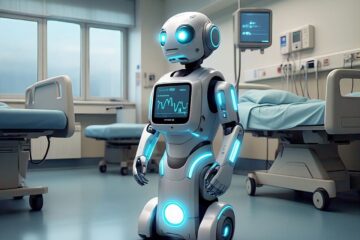
AI in Healthcare: Tools That Are Saving Lives
Artificial Intelligence (AI) has been revolutionizing the healthcare industry, offering innovative solutions that are transforming patient care and saving lives. With the application of AI technology, healthcare providers can improve diagnostics, personalize treatment plans, enhance operational efficiencies, and ultimately deliver better outcomes for patients. The impact of AI in healthcare is significant, paving the way for a future where medical advancements are driven by data-driven analytics and intelligent decision support systems.
Diagnosis and Treatment Planning
AI-powered diagnostic tools have shown remarkable accuracy in detecting diseases and conditions. For example, in a study published by Nature Medicine, researchers developed an AI model that detects lung cancer in CT scans with a 94.4% accuracy rate, outperforming radiologists. This highlights the potential of AI to assist medical professionals in identifying diseases at earlier stages, leading to more effective treatment strategies and improved patient outcomes.
Predictive Analytics and Precision Medicine
AI algorithms can analyze large datasets to identify patterns and make predictions about patient outcomes. By incorporating genetic, clinical, and lifestyle data, AI enables the practice of precision medicine, where treatments are tailored to individual patients based on their unique characteristics. According to a report by Deloitte, it is estimated that the application of precision medicine can lead to a 10-30% reduction in healthcare costs and a 25-50% increase in treatment effectiveness.
Operational Efficiencies and Resource Management
AI has the potential to streamline healthcare operations, optimize resource allocation, and reduce administrative burdens. Automated scheduling systems, predictive maintenance for medical equipment, and AI-powered chatbots for patient communication are just a few examples of how AI tools can enhance operational efficiencies in healthcare settings. A report by McKinsey & Company suggests that AI and data analytics could generate up to $100 billion in annual savings for the US healthcare economy by optimizing processes and reducing waste.
Challenges and Ethical Considerations
While the benefits of AI in healthcare are evident, there are also challenges and ethical considerations that need to be addressed. These include concerns about data privacy, algorithm biases, and the potential displacement of certain healthcare jobs. It is crucial for healthcare organizations to implement robust data security measures, ensure transparency in AI decision-making processes, and provide ongoing education and training for healthcare professionals to effectively utilize AI tools.
In conclusion, AI is becoming an indispensable tool in healthcare, offering tremendous potential to improve patient care, optimize resource utilization, and drive medical advancements. By leveraging AI-powered technologies, healthcare providers can deliver more accurate diagnoses, personalized treatment plans, and enhanced operational efficiencies, ultimately leading to better patient outcomes and saving lives.
Sources:
- Esteva, A., et al. (2017). “Dermatologist-level classification of skin cancer with deep neural networks.” Nature, 542(7639), 115–118. LINK
- Deloitte. (2018). “The Learning Health System and its Innovation Spine: The Role of Healthcare Analytics.” LINK
- McKinsey & Company. (2018). “Artificial intelligence in healthcare 2019: The impact on the industry, including examples and challenges.” LINK





